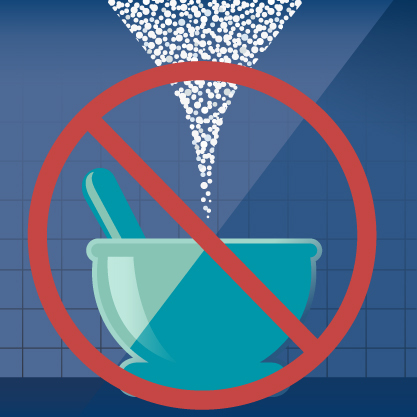Most requests for office stock made from 'bulk substances' have been rejected so far
 Listen to this story.
Listen to this story.
Compounding from bulk API

On Feb. 13, Vetmedin Solution, a liquid form of the veterinary heart-disease drug pimobendan, was approved by the U.S. Food and Drug Administration.
One day later, pimobendan solution for dogs and cats vanished from a list of animal drugs that the regulatory agency allows to be compounded for clinic "office stock" using active pharmaceutical ingredients, also called "bulk substances."
The brisk change demonstrates the vigor with which the FDA is executing a new approach to the use of compounded medications in veterinary practice.
"FDA worked really, really fast," observed Dr. Dawn Boothe, a veterinary clinical pharmacologist and internal medicine specialist who closely monitors drug issues, including compounding. Overall, Boothe gives the regulatory agency high marks in its approach to what has been a long-standing thorny issue in veterinary circles.
A major veterinary compounder, Wedgewood Pharmacy, has a decidedly different view. Noting that the regulator is being highly restrictive, the company told the VIN News Service by email: "The rejection of so many medications effectively means that the FDA is substituting its judgment for that of the veterinarians in determining what treatment is appropriate for office stock."
'Office stock,' 'bulk substances' explained
Compounding is the practice of making custom medications to meet unique or unusual needs of individual patients — needs that cannot be met by FDA-approved drugs. Compounders make medications in different flavors, forms or dosages from what's sold commercially.
Used in human medicine, too, compounded preparations are considered a critical tool in veterinary medicine, owing to the vast variety of patient shapes and sizes, whether finches, ferrets or Irish wolfhounds.
The rub is that compounded medicines have not undergone the FDA drug-approval process meant to ensure safety and efficacy, so the agency has been attempting to curtail their mass production.
In veterinary practice, larger-scale production is employed to make compounded preparations sold for "office stock" — that is, products that clinics purchase to keep immediately at hand, without a specific patient in mind.
The FDA says it is particularly concerned about the risk of harm from office stock, stating: "Because these products are made in larger quantities and may be widely distributed to veterinary hospitals, [they] could endanger a large number of animals if compounded improperly or under insanitary conditions."
Another complication in veterinary compounding is that federal law does not allow medications to be compounded from materials known as active pharmaceutical ingredients or bulk drug substances. Rather, compounded veterinary drugs are supposed to be made only from approved finished drugs.
However, compounders say using bulk substances is necessary for at least some custom preparations.
In a document issued in April 2022 titled Guidance for Industry #256 - Compounding Animal Drugs from Bulk Drug Substances, the FDA acknowledged the need in limited instances for the use of bulk ingredients, the use of office stock, and sometimes both at once. The guidance lays out conditions under which the agency will opt to not enforce the law — basically, giving its tacit consent. The document is not a regulation but is meant to provide a guide to the FDA's thinking about enforcement discretion.
Four key lists
The FDA invited veterinarians and pharmacists to nominate medications that they believe they need as office stock compounded from bulk ingredients, accompanied by rationales for why urgent access is necessary to avoid patient suffering or death or to protect public safety.
The agency then created four lists.
One list is of bulk substances that may be used in compounded office stock for nonfood-producing animals — namely, dogs, cats, horses and "minor species," including captive wildlife.
Another list is of bulk substances that may be compounded for office stock used in food-producing animals or free-ranging wildlife species.
A third list is of bulk substances under review. The FDA says it generally will "refrain from taking enforcement action" on these substances while their status is being decided.
The fourth list is of bulk drug substances that have been reviewed and are "not listed" — meaning they are not on lists of products that may be excused from enforcement. Plainly put, compounders using these bulk ingredients to generate medications sold for office stock may get in trouble with the FDA.
Letters

The process has been in place now for nearly two years. In that time, the agency has received 341 nominations and made determinations on roughly one-third.
Aside from the list of nominated drug substances still being decided, the list of those that are not de facto permitted for compounded office stock is the longest. As of today, it has 108 entries (73 pertaining to dogs, cats and/or horses; 25 to minor species not used in food production; and 10 to food animals and wildlife).
By comparison, the list of de facto allowed substances has 35 entries (20 for dogs, cats and/or horses; eight for nonfood-producing minor species; one for food animals; and six for free-ranging wildlife).
On all lists, some entries include a variety of forms and dosages. For completed reviews, the FDA briefly explains its decision.
Praising and panning
Boothe, the veterinary clinical pharmacologist and internist, has been watching the lists evolve as the FDA finishes a review or when a new commercial drug has been approved, as was the case with Vetmedin Solution.
"Everything I've seen [listed as allowed] I would agree there's probably a need for," she said, "and I do appreciate when they provide reasons for why they should not be listed, they seem rational. ... It isn't a capricious decision-making process."
An alumni professor emerita of Auburn University College of Veterinary Medicine and former director of its clinical pharmacology laboratory, Boothe now develops and maintains drug information resources for the Veterinary Information Network, an online community for the profession and parent of the VIN News Service. In addition, Boothe gives talks on compounding at veterinary conferences under the sponsorship of commercial drugmaker Boehringer Ingelheim.
Wedgewood, for its part, says that the FDA is unfairly biased toward pharmaceutical company products. "Our perspective is that these decisions prioritize the protection of FDA-approved commercial human and animal drugs, often without sufficiently considering the vital input from veterinarians and the specific needs of their patients," Wedgewood CEO Marcy Bliss said by email.
A New Jersey-based business that describes itself as the largest compounding pharmacy in the country devoted exclusively to animal health, Wedgewood has been the single biggest nominator of drugs to the list of bulk substances for compounded office stock, having put forth 200 medications for consideration.
Boothe underscored that the lists don't constrain what compounded preparations veterinarians may order for particular individuals. "Remember," she said, "this is just for office stock."
Veterinarians can still obtain compounded medications made from bulk substances for individual patients, she noted, at the same time pointing out, "The steps for demonstrating need such that the FDA can 'opt out' of regulating are more stringent than compounding from approved, marketed dosing forms."
Advocates of easier access to compounded veterinary drugs maintain that having to wait to fill a patient-specific prescription impedes care. Dr. Ernie Ward, co-founder of a buying group called VerticalVet and a member of Wedgewood's Veterinary Advisory Board, offered several examples.
"In mobile veterinary practices, many veterinarians rely on being able to dispense necessary treatments in remote locations to prevent pain and suffering and expedite recovery," he said by email. "In mixed animal and equine practices, delaying treatment by even a few days can cause a loss of animal value or utility. In zoo or exotic practices, administering a unique drug formulation while a patient is sedated or restrained is imperative. Often, a veterinarian practicing in a mobile capacity will not have a second opportunity to administer specialized treatment."
The wait to obtain individual prescriptions may disproportionately affect smaller veterinary practices and clients living in rural areas, Ward added: "In a small veterinary practice, it may not be until the following day that a staff member can begin the process of contacting a compounding pharmacist and requesting a patient-specific prescription."
Drug shortages and similar impediments
Considering the FDA's swift move to rescind its de facto allowance of compounded pimobendan solution after it approved a commercial form of the drug, Boothe wondered if the converse would be true during a commercial drug shortage. Would the FDA quickly add a backordered drug to the list of medications that it de facto permits to be compounded for office stock?
Perhaps, but not necessarily, according to FDA spokesperson Siobhan DeLancey, who said that "exercising enforcement discretion" with a compounded preparation is one of several ways the agency could address a drug shortage. "We'd likely first work with the sponsor to see if there are other ways to access the FDA-approved drug or a foreign-approved version," she said, adding, "FDA addresses each drug shortage on a case-by-case basis."
Another question is what practitioners should do after a new commercial drug is approved but before it is actually available. Case in point: Vetmedin Solution. The manufacturer, Boehringer Ingelheim, has yet to set a date for the drug's market launch.
DeLancey said clinicians who need office stock of compounded pimobendan solution in the meanwhile may "let the agency know of their desire to have access" by contacting the FDA at AnimalDrugShortages@fda.hhs.gov or AskCVM@fda.hhs.gov.
Whether the FDA would, of its own initiative, return pimobendan solution to the list of de facto allowed office stock compounded with bulk substances until the approved drug is actually available, DeLancey could not say.